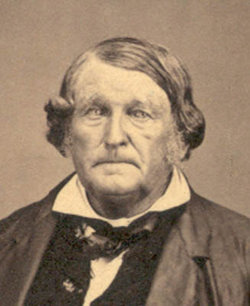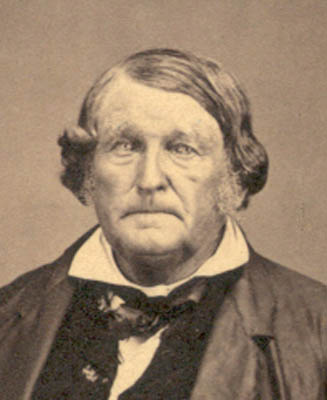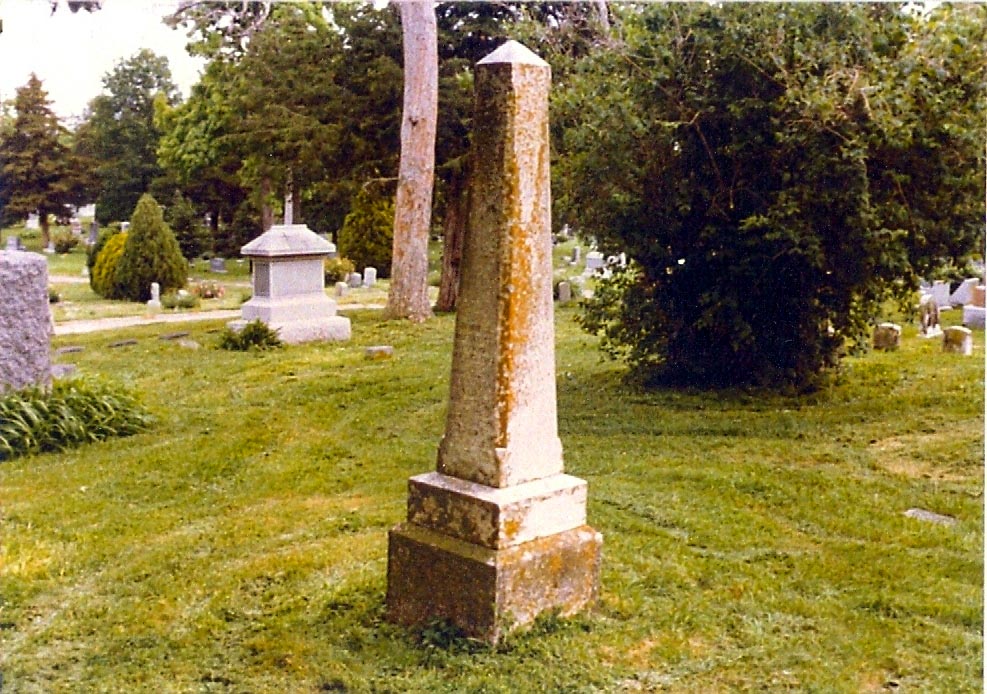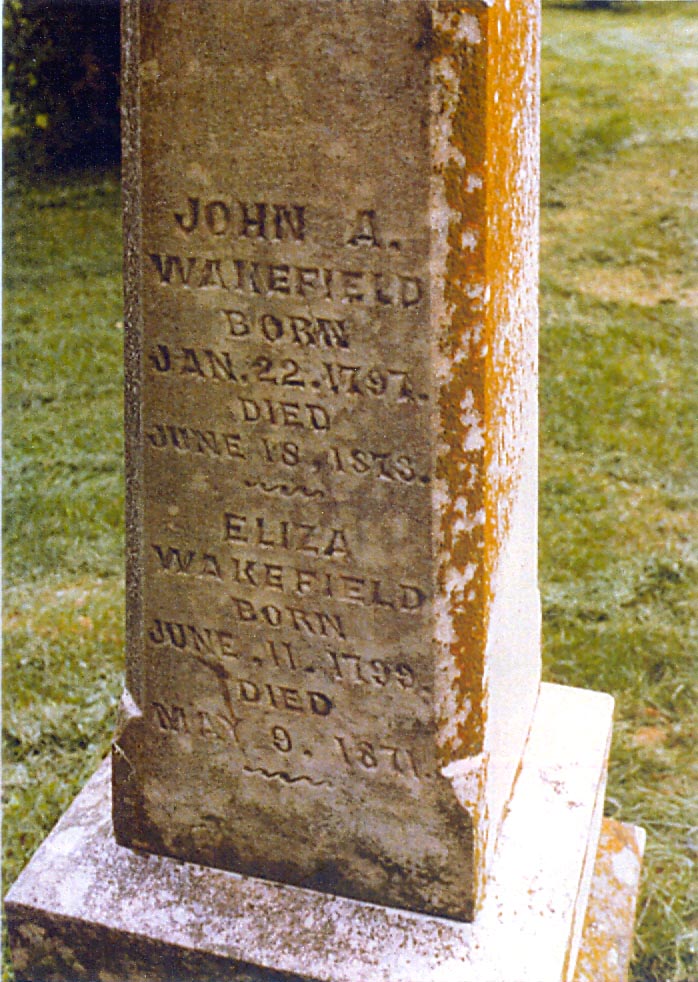Veteran of Black Hawk War where he met Abraham Lincoln.
Letter by John's son, W.H.T. Wakefield, dated Lawrence, KS, 28 Sep 1880:
"My father, the late Judge J. A. Wakefield, was a life-long friend of Lincoln's, they having served through the Black Hawk war together and been in the Illinois Legislature together, during which latter time Lincoln boarded with my father in Vandalia, which was then the state capital. I remember of his visiting my father at Galena, in 1844 or 1845. They continued to correspond until Lincoln's death."
From "Sketch of the life of the late John A. Wakefield" :
John was born at Columbia, South Carolina, of old Revolutionary stock; his father and several uncles belonging to "Marion's Immortal Band." His mother was a member of the somewhat noted Barnwell family of his native State.
He moved with his family to Kentucky, then Illinois at about age 15. He was a volunteer in the War of 1812, and served as a scout for the Union Army.
He married Eliza Brown Thompson in 1817.
He served throughout the Black Hawk War attaining the rank of Major, and later wrote the only eye-witness account of the War.
He served several terms in the Illinois Legislature, and was a close personal friend of Stephen A. Douglas. He took an active part in opposing the effort to admit slavery in Illinois.
In 1846 he moved to Wisconsin and was engaged briefly in lead mining. He went to St. Paul, Minnesota, where he built a large hotel, and also served several terms as Police Judge and City Justice.
In July 1854, he and wife Eliza, pitched a tent in what is now Douglas County, at that time populated by only one or two other families.
"His history from that time until the present is familiar to most of the older settlers. Selected by the Free State men in 1854, as their candidate for Delegate to Congress, he received a large majority of the legal votes cast in the territory. During the long border warfare of 1855, 1856 and 1857, he did his whole duty as one of the Free State leaders, always counseling a firm resistance to the encroaches and outrages of the slave power. At the first Squatters meeting in 1854 he was chosen Judge of the Squatter's Court, and performed his duties in a manner that gave satisfaction to all. He was chosen one of the Senators in the first Territorial legislation; being expelled by the Border Ruffians from his seat, which was wanted for a "bogus" member. In 1856, while en route to Illinois for aid in men and arms, he was captured by Buford's South Carolinians and narrowly escaped death as a "traitor to his native State."
[On 1 Sep 1856, invaders burned every building on the Wakefield homestead, a fine library, and a manuscript ready for publication, together with 140 acres of wheat and oats. LSL]
He was chairman of the Judiciary Committee of the Topeka Constitutional Convention and has served as Representative in the Legislature of Douglas county.
He was ever distinguished for great energy of character and a high sense of personal honor, his word being as good as his bond wherever he was known. Though possessed of a quick and fiery temper, he had malice for none and charity for all; was an honorable opponent, and ever "held an honorable enemy next to a bosom friend." Hospitality was another virtue which he could justly claim, never being known to turn a person from his door with his wants unrelieved.
He has been for forty-two years a member of the Methodist Episcopal Church, and left this world with a bright and confident hope of awaking in a better one. He is mourned by surviving children, and a large circle of warm personal friends."
=========================================
The Daily Kansas Tribune (Lawrence, KS)
29 Dec 1863 - Pg 3
HON. John A. Wakefield called on us yesterday to pay for the Daily Tribune. They can't do without it out his way. The Judge looks better than we have seen him for a long time. He informs us that it is a mistake that he has declined being a candidate for Speaker. Few men have done so much for Kansas as this venerable Free State man, and honors could not well be bestowed on a worthier recipient.
=========================================
Father: William Wakefield (1765-1830)
Mother: Diana Varner/Verner (1772-1877)
Brother:
Andrew Jackson Wakefield (1815-1868)
Veteran of Black Hawk War where he met Abraham Lincoln.
Letter by John's son, W.H.T. Wakefield, dated Lawrence, KS, 28 Sep 1880:
"My father, the late Judge J. A. Wakefield, was a life-long friend of Lincoln's, they having served through the Black Hawk war together and been in the Illinois Legislature together, during which latter time Lincoln boarded with my father in Vandalia, which was then the state capital. I remember of his visiting my father at Galena, in 1844 or 1845. They continued to correspond until Lincoln's death."
From "Sketch of the life of the late John A. Wakefield" :
John was born at Columbia, South Carolina, of old Revolutionary stock; his father and several uncles belonging to "Marion's Immortal Band." His mother was a member of the somewhat noted Barnwell family of his native State.
He moved with his family to Kentucky, then Illinois at about age 15. He was a volunteer in the War of 1812, and served as a scout for the Union Army.
He married Eliza Brown Thompson in 1817.
He served throughout the Black Hawk War attaining the rank of Major, and later wrote the only eye-witness account of the War.
He served several terms in the Illinois Legislature, and was a close personal friend of Stephen A. Douglas. He took an active part in opposing the effort to admit slavery in Illinois.
In 1846 he moved to Wisconsin and was engaged briefly in lead mining. He went to St. Paul, Minnesota, where he built a large hotel, and also served several terms as Police Judge and City Justice.
In July 1854, he and wife Eliza, pitched a tent in what is now Douglas County, at that time populated by only one or two other families.
"His history from that time until the present is familiar to most of the older settlers. Selected by the Free State men in 1854, as their candidate for Delegate to Congress, he received a large majority of the legal votes cast in the territory. During the long border warfare of 1855, 1856 and 1857, he did his whole duty as one of the Free State leaders, always counseling a firm resistance to the encroaches and outrages of the slave power. At the first Squatters meeting in 1854 he was chosen Judge of the Squatter's Court, and performed his duties in a manner that gave satisfaction to all. He was chosen one of the Senators in the first Territorial legislation; being expelled by the Border Ruffians from his seat, which was wanted for a "bogus" member. In 1856, while en route to Illinois for aid in men and arms, he was captured by Buford's South Carolinians and narrowly escaped death as a "traitor to his native State."
[On 1 Sep 1856, invaders burned every building on the Wakefield homestead, a fine library, and a manuscript ready for publication, together with 140 acres of wheat and oats. LSL]
He was chairman of the Judiciary Committee of the Topeka Constitutional Convention and has served as Representative in the Legislature of Douglas county.
He was ever distinguished for great energy of character and a high sense of personal honor, his word being as good as his bond wherever he was known. Though possessed of a quick and fiery temper, he had malice for none and charity for all; was an honorable opponent, and ever "held an honorable enemy next to a bosom friend." Hospitality was another virtue which he could justly claim, never being known to turn a person from his door with his wants unrelieved.
He has been for forty-two years a member of the Methodist Episcopal Church, and left this world with a bright and confident hope of awaking in a better one. He is mourned by surviving children, and a large circle of warm personal friends."
=========================================
The Daily Kansas Tribune (Lawrence, KS)
29 Dec 1863 - Pg 3
HON. John A. Wakefield called on us yesterday to pay for the Daily Tribune. They can't do without it out his way. The Judge looks better than we have seen him for a long time. He informs us that it is a mistake that he has declined being a candidate for Speaker. Few men have done so much for Kansas as this venerable Free State man, and honors could not well be bestowed on a worthier recipient.
=========================================
Father: William Wakefield (1765-1830)
Mother: Diana Varner/Verner (1772-1877)
Brother:
Andrew Jackson Wakefield (1815-1868)
Family Members
-
George Washington Wakefield
1821–1866
-
![]()
Mary Ann Wakefield Willard
1823–1903
-
Martha Ann Wakefield
1825–1855
-
![]()
Emily Brown Wakefield Terry
1829–1910
-
![]()
Eliza Jane Wakefield Snyder
1831–1901
-
![]()
1LT William Harrison 'Thompson' Wakefield
1834–1913
-
![]()
John Allen Wakefield Jr
1836–1865
-
Thomas Jefferson Wakefield
1838–1890












